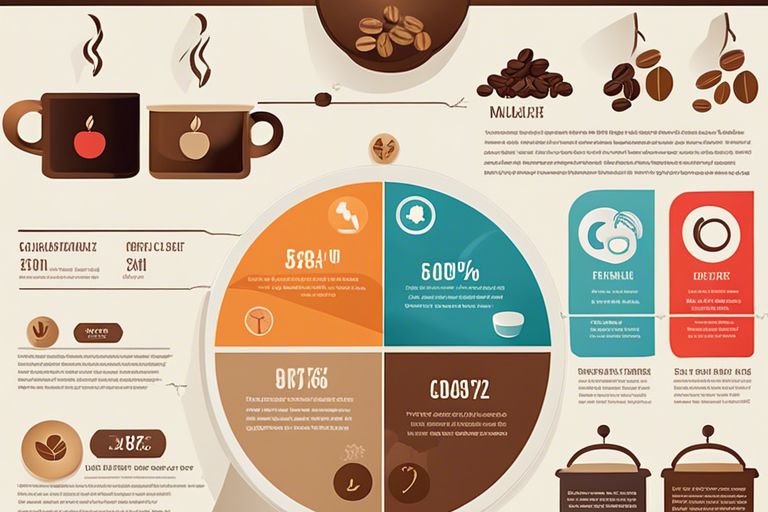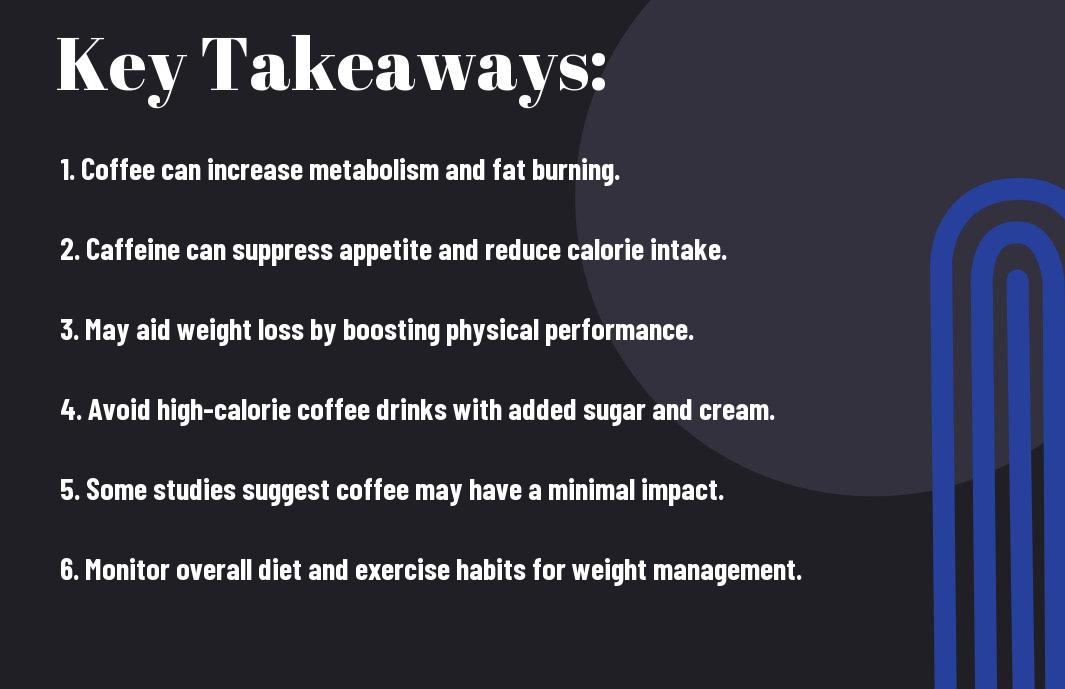Weight loss journey can often be accompanied by the lingering question of whether our daily cup of coffee is a friend or foe. In this informative blog post, we examine into the intricacies of how coffee consumption can impact weight gain. Let’s uncover the science behind this beloved morning ritual and its effects on our waistline.

Key Takeaways:
- Caffeine boosts metabolism: Coffee can have a positive impact on weight management by stimulating thermogenesis, increasing the number of calories burnt.
- Black coffee is low in calories: Opting for black coffee without added sugar or cream can help in weight control as it is a low-calorie beverage.
- Moderation is key: While coffee can aid in weight loss, excessive consumption may lead to negative effects such as disrupted sleep patterns and increased stress levels, which can indirectly contribute to weight gain.
The Caffeine Conundrum
While coffee is a beloved beverage for many, its caffeine content can create a conundrum when it comes to weight gain. Caffeine is known to have various effects on the body, some of which may impact metabolism and appetite.
Caffeine’s role in metabolism
Caffeine’s impact on metabolism is a topic of much debate. Some studies suggest that caffeine can increase metabolic rate, helping the body burn more calories. This thermogenic effect of caffeine is one reason why it is often found in weight loss supplements.
How caffeine affects appetite
One way caffeine may influence weight gain is through its effects on appetite. Some people find that consuming caffeine suppresses their appetite, leading them to eat less. However, this appetite-suppressing effect may not be the same for everyone, as tolerance to caffeine can vary among individuals.
The conundrum lies in the fact that while caffeine may boost metabolism and reduce appetite in some people, leading to potential weight loss, excessive consumption or reliance on caffeine can also have negative effects on overall health and well-being. It’s important to strike a balance and not rely solely on caffeine for weight management.
The Calorie Connection
Coffee’s calorie contribution
Even though black coffee is virtually calorie-free, the way you dress it up can significantly impact its caloric content. Adding sugar, cream, flavored syrups, or whipped cream can turn your innocent cup of joe into a calorie bomb.
Hidden calories in coffee drinks
To truly understand the impact of coffee on weight gain, we must investigate into the world of specialty coffee drinks. Drinks like lattes, mochas, and frappuccinos can pack a hefty caloric punch due to added sugars, syrups, and whipped cream. These seemingly harmless additions can add hundreds of calories to your daily intake, leading to weight gain over time.
On the surface, coffee may seem like a harmless indulgence, but hidden within those frothy, flavored concoctions are often hidden calories that can sabotage your weight loss efforts. It’s necessary to be mindful of what you’re putting into your coffee and opt for healthier alternatives whenever possible.
The Hormone Factor
All too often, when it comes to weight gain and loss, we tend to focus solely on calories in versus calories out. However, the role of hormones in regulating our metabolism and fat storage cannot be overlooked. Coffee, with its caffeine content, can have varying effects on different hormones in our body, ultimately influencing our weight management.
Caffeine’s impact on insulin sensitivity
Sensitivity to insulin, the hormone responsible for regulating blood sugar levels, plays a crucial role in weight gain. Studies have shown that caffeine can affect insulin sensitivity, potentially improving it in some individuals. By enhancing how our body responds to insulin, coffee could have a positive impact on weight management.
Cortisol and weight gain
Cortisol, often referred to as the stress hormone, is another key player in the weight gain game. When we’re stressed, cortisol levels spike, leading to increased fat storage, particularly around the abdominal area. Coffee consumption can temporarily elevate cortisol levels, but the long-term effects are still up for debate.
It’s necessary to note that while cortisol can contribute to weight gain, its relationship with coffee consumption is complex. Factors such as the individual’s stress levels, overall diet, and lifestyle habits all come into play when considering the impact of coffee on cortisol and its implications for weight management.

The Sleep-Weight Connection
Caffeine’s effect on sleep quality
Your daily cup of coffee may be affecting your sleep more than you realize. Caffeine is a stimulant that can interfere with your body’s natural sleep-wake cycle, making it harder to fall asleep and stay asleep. Any disruption to your sleep quality can have negative effects on your body’s ability to regulate weight.
Studies have shown that consuming caffeine even six hours before bedtime can significantly worsen sleep quality. This means that that late afternoon latte or post-dinner espresso could be impacting the quality of your sleep and, in turn, your weight management efforts.
Sleep deprivation and weight gain
For those who regularly struggle with getting enough hours of shut-eye, the consequences can extend beyond just feeling groggy the next day. Sleep deprivation has been linked to weight gain and obesity. Lack of sleep can disrupt hormones that regulate appetite, leading to increased cravings for unhealthy, high-calorie foods.
Understanding the importance of prioritizing sleep alongside a balanced diet and exercise routine is crucial for overall health and weight management. Making small changes, like cutting back on caffeine intake in the afternoon and establishing a calming bedtime routine, can have a significant impact on both the quality of your sleep and your weight goals.
The Gut Microbiome
Many studies have shown that the gut microbiome, which consists of trillions of bacteria living in our intestines, plays a crucial role in various aspects of our health, including metabolism and immune function. The balance of good and bad bacteria in the gut can be influenced by various factors, including diet, lifestyle, and medications.
Caffeine’s Influence on Gut Bacteria
For those who enjoy their morning cup of coffee, the caffeine in it can have both positive and negative effects on the gut microbiome. Some studies suggest that caffeine can stimulate the growth of beneficial bacteria in the gut, which can have a positive impact on overall health. However, excessive caffeine consumption may also lead to an imbalance in the gut microbiota, potentially contributing to digestive issues and inflammation.
Gut Health and Weight Management
The gut microbiome is increasingly being linked to weight management, with emerging research suggesting that the types of bacteria in our gut may influence our body weight. The composition of the gut microbiome can affect how we extract and store energy from food, as well as regulate hunger and satiety signals sent to the brain.
With further research, scientists hope to uncover how specific components in coffee, beyond just caffeine, may interact with the gut microbiome to ultimately impact weight gain or weight loss. Understanding these complex interactions could lead to personalized dietary recommendations for individuals based on their unique gut microbiota composition.
Individual Variations
Genetic differences in caffeine metabolism
Keep in mind that genetic differences play a significant role in how our bodies metabolize caffeine. Some individuals have variations in the genes that code for the enzymes responsible for breaking down caffeine in the liver. This can result in people either being “fast metabolizers,” who process caffeine quickly, or “slow metabolizers,” who process it more slowly.
Sensitivity to caffeine’s effects
Individuals also vary in their sensitivity to caffeine’s effects. While some people can drink a strong espresso before bed and fall asleep without any issues, others may feel jittery and anxious after just a small cup of coffee. These differences in sensitivity can impact how coffee consumption affects weight gain in individuals.
It’s important to note that factors such as age, weight, and tolerance levels can also influence how sensitive someone is to caffeine. For some, caffeine may increase metabolism and aid in weight loss, while for others, it may disrupt sleep patterns and lead to weight gain. Understanding your own body’s response to caffeine can help you make informed choices about your coffee consumption and its potential impact on your weight.

Summing up
Taking this into account, it is evident that coffee can have both positive and negative effects on weight gain. While it may boost metabolism and provide a temporary decrease in appetite, it can also lead to increased cortisol levels and disrupt sleep patterns, both of which can contribute to weight gain. Moderation and mindful consumption of coffee is key in managing its impact on weight and overall health.
FAQ
Q: Does drinking coffee cause weight gain?
A: In moderation, coffee is unlikely to directly cause weight gain. However, certain high-calorie coffee beverages and added sweeteners can contribute to excess calorie intake, leading to weight gain.
Q: How does caffeine in coffee affect metabolism?
A: Caffeine is a stimulant that can increase metabolic rate and fat oxidation, potentially aiding weight loss. However, the effects may vary among individuals and can diminish with regular consumption.
Q: Can coffee suppress appetite and help with weight management?
A: Coffee can act as an appetite suppressant for some people due to its effects on hunger hormones. This temporary reduction in appetite may help with managing overall calorie intake and weight control.
Q: What role does insulin sensitivity play in relation to coffee and weight gain?
A: Some studies suggest that coffee consumption may improve insulin sensitivity, which could potentially lower the risk of developing conditions like obesity and type 2 diabetes. However, individual responses may vary.
Q: Are there any potential downsides to drinking coffee for weight management?
A: While coffee can offer certain benefits for weight management, excessive consumption or reliance on high-calorie coffee beverages loaded with sugar and cream can contribute to weight gain and other health issues. Moderation is key.





